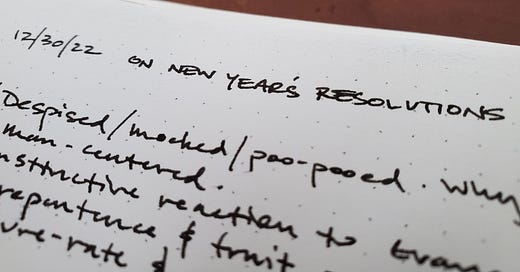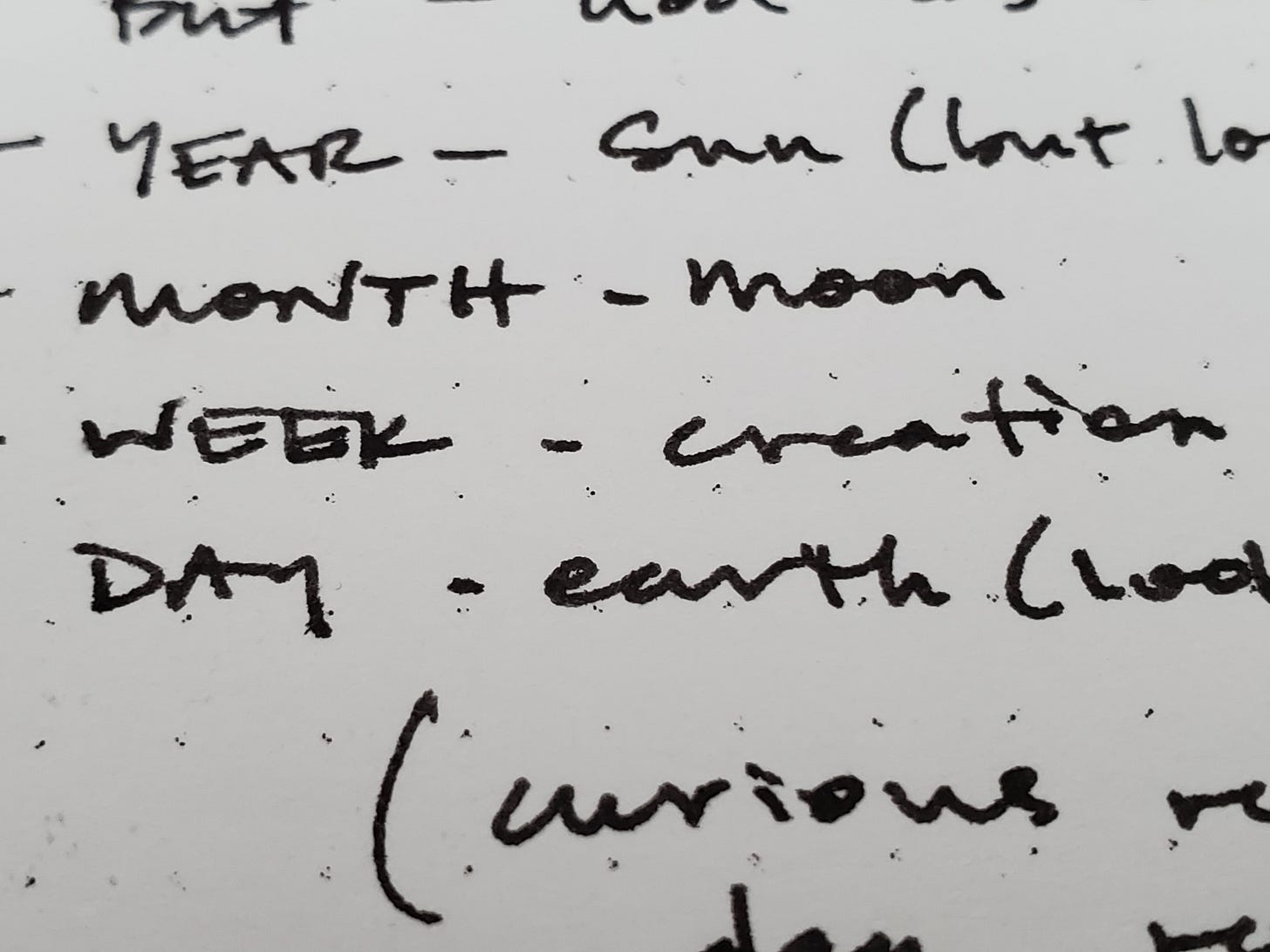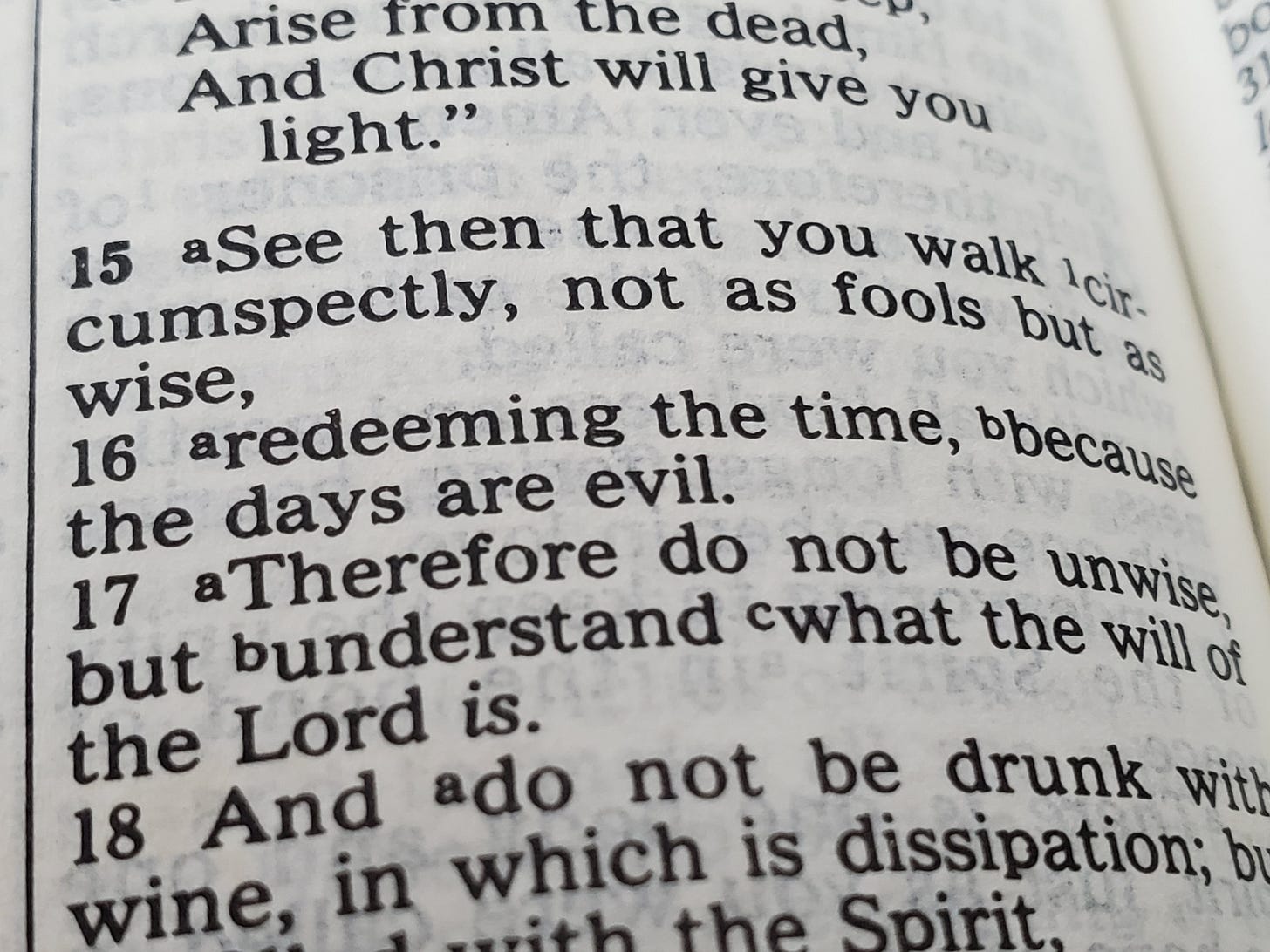(Wednesday What-Not is free. Your subscription is a helpful donation, the tip jar.)
1/ Resolve is not Repentance… fine.
Merry 5th Day of Christmas!
It's New Year's resolution time.
It's been trendy, for as long as I've been a pastor, to poke at New Year's resolutions. I don't exactly know why. Perhaps they are too man-centered. Perhaps their notorious failure rate is a helpful illustration of original sin, how our intentions can never live up to our actions, and how we think more highly of ourselves and we ought. Perhaps, in Lutheran circles, we're reacting to the Evangelical confusion of repentance and the fruit of repentance.
(Remembering that repentance is contrition worked by the hearing of the law and faith worked by the hearing of the gospel, and the fruit of repentance is the life of good works and patient suffering that follows repentance.)
Resolutions seem suspiciously close to this confusion of repentance.
Whatever the reason, it's common to poo-poo New Year's resolutions. I've done it myself, even from the pulpit, preaching about how our resolve is weak, and our hope rests solely in the resolve of our Lord Jesus Christ to save us.
This is true enough, but to set aside New Year's resolutions is to set aside the celebration of a year, an old and a new, and I think it is a subtle despising of the Lord's gift of time.
2/ On Time
For the people who pay attention to this stuff, different cultures have different views of time. I'm told that people from the east have a cyclical view of time, no beginning or end, just one cycle after another. This is supposed to contrast with a Western view of time, which is linear. There is a start and a finish; a beginning and an end; a source and a goal; an alpha and an omega; a formal and final cause, etc.
This is well established in the Bible. God created the world out of nothing, and history is hurtling toward a last day and hour (soon we hope and pray). That's a straight time-line.
But while we live in this linear view of time, we should not overlook the fact that the Lord has built in cycles along the way. A bunch of loops that add up to the straight line.
YEAR: The sun loop (which looks to us like an earth loop.)
MONTH: The Moon loop.
WEEK: The Creation loop, which is a universal but mysteriously difficult to see loop of time.
DAY: The earth loop (which looks to us like the sun loop.)
(And there's a curious little difference between the way we are given to think about time in the Old Testament versus the New Testament. In the Old Testament the day begins with night, and ends with day. It begins with rest, and ends with work. On the other hand, the week begins with work and ends with rest, Sabbath. This is reversed in the New Testament. The day begins with working ends with rest, but the week begins with Sabbath and ends with work. I don't know what this means. I'm not even sure it matters, but it's curious to me, and I can't pass by this conversation on time without mentioning it.)
Each of these loops has a beginning and an end, a start and a stop that God has built in to creation for us.
Genesis 1:14–19 (NKJV): Then God said, “Let there be lights in the firmament of the heavens to divide the day from the night; and let them be for signs and seasons, and for days and years; and let them be for lights in the firmament of the heavens to give light on the earth”; and it was so. Then God made two great lights: the greater light to rule the day, and the lesser light to rule the night. He made the stars also. God set them in the firmament of the heavens to give light on the earth, and to rule over the day and over the night, and to divide the light from the darkness. And God saw that it was good. So the evening and the morning were the fourth day.
The times and the seasons are for us. The light and the dark, the day and the night, the winter and the summer, all these little loops, all these starts and stops, all of these are all for us, glorious gifts from our gracious God.
We hope to be good stewards of these gifts.
3/ A Year, Old and New
When we count the new year is somewhat arbitrary. I'm sure that January 1st has something to do with Julius Caesar and some other ancient determination that managed to stick. We could have lost track a few centuries ago, and our January 1st is really February 7th, or whatever.
It is nice that our new year is in the dead of winter, 10 days after the days start getting longer. That's nice, but not necessary.
But it is important that there is a day where we say, “Now the old year is finished. Now the New Year starts.” This orients us in time, and gives the opportunity to look back and look forward.
Remembering is thanksgiving, which, for the Christian, is an act of worship. As we try to stand still for a moment, and look back, our reflection on the past is a remembering of the mercy and kindness of God. We always first give thanks.
We are also able to observe our own little slice of history, and notice our own failures. We confess our sins, rejoice in the Lord's mercy, and consider how to better love and serve our neighbors.
Which leads to our looking forward. Another year is coming toward us. How can we be good stewards of this gift of time, and use it to bless the Lord and serve our neighbor? It's good to plan, to stretch for something a bit out of reach, to plot out our love and service, to retool. The new year is a gift from God, an assist on this meditation.
It's part of our life of hope.
4/ Three Hopes
Will you let me get away with this one? The Christian lives with three hopes, two great and one small.
Our first great hope is in Christ our Redeemer, whose death and resurrection are our forgiveness, life, salvation, and great hope.
Our second great hope is in Christ the King returning soon to judge the living in the dead, and establish the new heaven and earth where the righteous dwell. This is our hope for the resurrection and the life of the world to come.
But sandwiched between these two great hopes is our small hope, our lesser hope, our hope for tomorrow, our hope that we might begin to love and serve our neighbor, and do some little something to bless the people around us. This is the hope that energizes our vocations, that motivates our love, and that is the reason we make New Year's resolutions. We hope that we might do something a little bit better tomorrow than we did yesterday.
If this was our only hope, it would be despair. But sandwiched between the love of Christ and the joy of the resurrection, this little hope is wonderful, and certainly not to be despised.
5/ Redeem the Time
St. Paul gives Timothy 3 vocations to meditate on when considering what it means to be a faithful Christian and pastor: The soldier, the athlete, and the farmer (see 2 Timothy 2:3-6). I think it's the farmer who needs to be held up as the wrestler with time (particularly since most of the meaningful work of the farm, as Jesus mentions in the parable, happens at night when the farmer is sleeping).
So let's push the analogy a bit.
The farmer has things to uproot, to trim, to cultivate, and to plant. Things to stop, to shrink, to grow, and to start. We can bring these four questions to our own resolving:
What do I want to quit doing this year?
What do I want to do less this year?
What do I want to do more of this year?
What do I want to start this year?
(Ol' Dad has the four questions like this: CUT, EDIT, COPY, WRITE.)
We can always ask ourselves these questions, but if we don't ask them at the new year, we probably never will. And I'd suggest asking them together with your family. It's nice.
I don't know if this is what Paul is talking about when he tells us to redeem the time (Ephesians 5:14 and Colossians 4:5), but I don't think it's a bad idea to try to do a little better while we wait for the best to come.
For me? This year I want to pray more with my family, and stretch. Next week will be driving home from Colorado. I'm sure Keri we'll have a few more ideas for me! We'll see how it goes.
God be praised for another year of His grace and kindness. God be praised that He gives us the new year to stop, reflect on the past, consider the future, and ask for His wisdom. God be praised that we live under His grace, that He forgives our failures, and He sustains our hope. May God give us another year of wisdom as we wait for His return in glory.
Happy New Year! PrBW
Oh, if you're going to resolve to do some more Bible reading, here's the plan I put together: https://wolfmueller.co/biblereadingplan/
(Wednesday What-Not is free. Your subscription is a helpful donation, the tip jar.)







Dear Pastor, dear brother, that was a great end of year-what-not-mail :D I loved reading it and will use some of it for my brothers and sisters and my own family.
What I love most about your ministry is the fun that is combined with sound theology! Hard to find these days - the joy of theology - you rekindled that little flame in me. Thank you. And many greetings from Germany, I hope to see you while you are travelling here next year :) With God's Love and Peace. Marlene
Your 3 hopes are a wonderful comfort. Thank you!